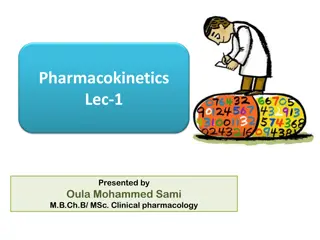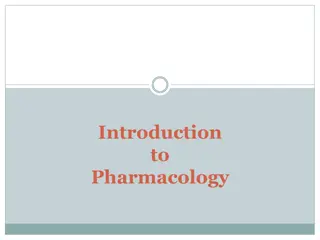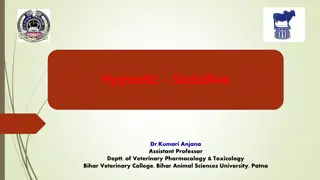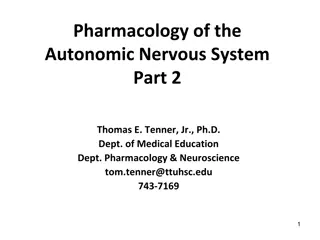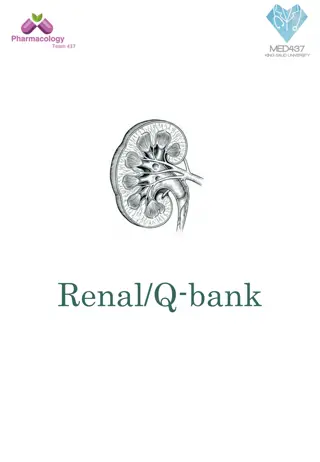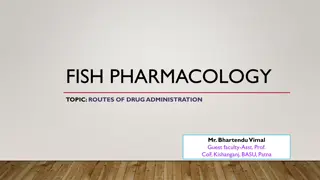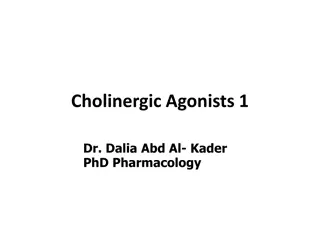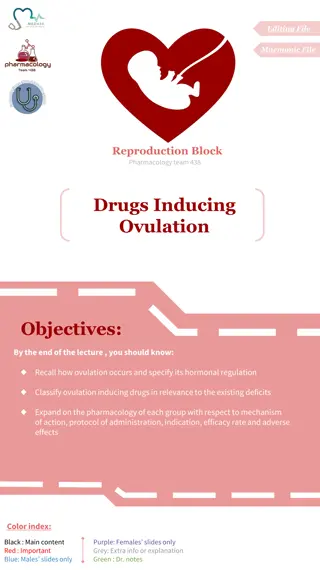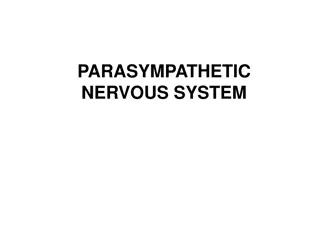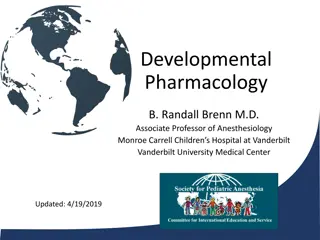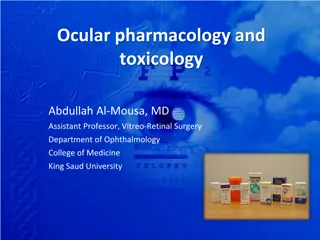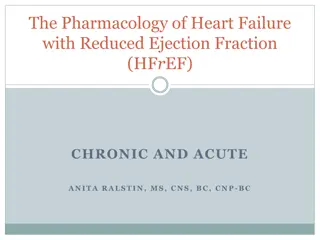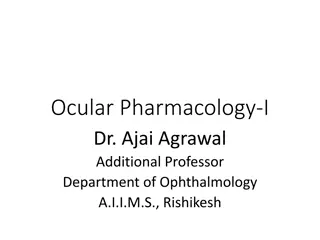
Top 100 Drugs and Their Uses
Explore a comprehensive list of the top 100 drugs, including brand names, generic names, indications, and common uses. Learn about prescription and nonprescription medications, as well as alternative therapies for various diseases. Identify frequently prescribed drugs, their adverse effects, and contraindications to enhance your pharmaceutical knowledge.
Download Presentation

Please find below an Image/Link to download the presentation.
The content on the website is provided AS IS for your information and personal use only. It may not be sold, licensed, or shared on other websites without obtaining consent from the author. If you encounter any issues during the download, it is possible that the publisher has removed the file from their server.
You are allowed to download the files provided on this website for personal or commercial use, subject to the condition that they are used lawfully. All files are the property of their respective owners.
The content on the website is provided AS IS for your information and personal use only. It may not be sold, licensed, or shared on other websites without obtaining consent from the author.
E N D
Presentation Transcript
This Presentation Will Help You To... Describe prescription, nonprescription medications, and alternative therapies used to treat diseases. Identify brand names, generic names, and indication for the most frequently prescribed drugs Recognize adverse effects and contraindication for the most frequently prescribed drugs
Top 100 Drugs Brand Name Generic Name 1. Lipitor Atorvastatin 2. Lexoyl, Synthroid Levothyroxine 3. Zestril Lisinopril 4. Prilosec Omeprazole 5, Glucophage Metformin 6. Lotrel Amlodipine/Benzapril 7. Zocor Simvastatin 8. Lortab, Vicodin Hydrocodone-Acetaminophen 9. Toprol XL Metoprolol Succinate 10. Cozaar Losartan 11. Ambien Zolpidem 12. Z-pak Azithromycin 13. Hydrodiuril Hydrochlorothiazide
Top 100 Drugs Brand Name Generic Name 14. Lasix Furosemide 15. Lopressor Metoprolol Tartrate 16. Protonix Pantoprazole 17. Neurontin Gabapentin 18. Amoxil Amoxicillin 19. Deltasone Prednisone 20. Zoloft Sertaline 21. Flomax Tamsulosin 22. Flonase Fluticasone 23. Pravachol Pravastatin 24. Ultram Tramadol 25. Singulair Montelukast 26. Lexapro Escitalopram
Top 100 Drugs Brand Name Generic Name 27. Coreg Carvedilol 28. Xanax Alprazolam 29. Coumadin Warfarin 30. Mobic Meloxicam 31. Plavix Clopidogrel 32. Crestor Rosuvastatin 33. Zyloprim Allopurinol 34. Wellbutrin XL Bupropion XL 35. Benicar Olmesartan 36. Celexa Citalopram 37. Tenormin Atenolol 38. Zestril Lisinoprol/HCTZ 39. Cialis Tadalafil
Top 100 Drugs Brand Name Generic Name 40. Cymbalta Duloxetine 41. Tricor Fenofibrate 42. Livalo Pitavastatin 43. Prozac Fluoxetine 44. Effexor Venlafaxine 45. Ventolin HFA Albuterol 46. Adderall Amphetamine/Dextroamphetamine 47. Flexeril Cyclobenaprine 48. Desyrel Trazodone 49. Medrol Methylprednisolone 50. Lantus Insulin Glargine 51. Advair Diskus Fluticasone/Salmeterol 52. Klor-Con Potassium Chloride
Top 100 Drugs Brand Name Generic Name 54. Amaryl Glimepiride 55. Levaquin Levofloxacin 56. Percocet Oxycodone/Acetaminophen 57. Bactrim Sulfamethoxazole/Trimethoprim 58. Celebrex Celecoxib 59. Keflex Cephalexin 60. Klonopin Clonazepam 61. Cipro Ciprofloxacin 62. Diovan-HCT Valsartan-HCTZ 63. Tylenol Acetaminophen 64. Nexium Esomeprazole 65. Viagra Sildenafil 66. Vytorin Ezetimibe/Simvasatin
Top 100 Drugs Brand Name Generic Name 67. Maxzide Triamterene/HCTZ 68. Aldactone Spironolactone 69. Motrin, Advil Ibuprofen 70. Bumex Bumetanide 71. Zetia Ezetimibe 72. Proair HFA Albuterol 73. Ativan Lorazepam 74. Zantac Rantidine 75. Humalog Insulin Lispro 76. Prevacid Lansoprazole 77. Januvia Sitagliptin 78. Proscar Finasteride 79. Diovan Valsartan
Top 100 Drugs Brand Name Generic Name 80. Bystolic Nebivolol 81. Valtrex Valacyclovir 82. Omnicef Cefdinir 83. Xalatan Latanoprost 84. Doryx Doxycycline 85. Lyrica Pregabalin 86. Diflucan Fluconazole 87. Testim, Androgel Testosterone 88. Kenalog Triamcinolone 89. Paxil Paroxetine 90. Xarelto Rivaroxaban 91. Mevacor Lovastatin 92. Inderal Propranolol
Top 100 Drugs Brand Name Generic Name 93. Estrace Estradiol 94. Aleve, Naprosyn Naproxen 95. Actos Pioglitazone 96. Oxycontin Oxycodone 97. Altace Ramipril 98. Ritalin, Concerta Methylphenidate 99. Imdur Isosorbide Mononitrate 100. Fosamax Alendronate
Often work by altering neurotransmitter activity at the neuron level Include: analgesics, anti-inflammatory, antianxiety, antidepressant, and antipsychotic medications These medications can range from length of use from short to long-term use
Analgesic Drugs Uses Thesedrugs are used to relieve or reduce pain Commonly prescribed drugs Oxycodone (Oxycontin), Hydrocodone- Acetaminophen (Vicodin, Lortab), Oxycodone-Acetaminophen (Percocet) How they work Produce an effect that reduced perception and reaction to pain, increased pain tolerance Adverse effects Stomach upset, constipation Contraindications Respiratory issues, history of opioid dependency, liver issues
Anti-Inflammatory Drugs Uses Used to reduce pain and swelling associated with pain Commonly prescribed drugs Celecoxib (Celebrex), Ibuprofen (Motrin, Advil), Meloxicam (Mobic), Naproxen (Aleve, Naprosyn) How they work Reduce the production of enzymes that cause inflammation Adverse effects Stomach upset, stomach bleeding, insomnia Contraindications History of ulcers, uncontrolled blood pressure, history of bowel disease, previous stroke
Anti-Anxiety Drugs Uses Used to treat anxiety and pain attacks (additionally some are used in seizure disorders and for insomnia) Commonly prescribed drugs Alprazolam (Xanax), Diazepam (Valium), Lorazepam (Ativan), Clonazepam (Ativan), Zolpidem (Ambien used for insomnia) How they work Most modify brain function to influence modd, perception, and consciousness Adverse effects Dizziness, drowsiness Contraindications Respiratory issues, history of dependency
Anti-Depressants Uses Used to treat depression and other related disorders such as post-traumatic stress disorder Commonly prescribed drugs Venlafaxine (Effexor), Sertaline (Zolofy), Fluoxetine (Prozac), Paroxetine (Paxil), Bupropion (Wellbutrin) How they work Balance chemicals in the brain (neurotransmitters) that affect mood and emotions Adverse effects Dry mouth, nausea, headache, dizziness Contraindications Patients taking the drug meperidine or antidepressants of other kinds, history of seizure disorder
These agents are used to treat high blood pressure and help prevent stroke, heart attack and other types of heart disease Consists of various agents for hypertension (high blood pressure) and hyperlipidemia (high cholesterol) Typically use of these drugs are long term
Antihypertensive Drugs Uses Used to treat hypertension and related heart conditions such as heart failure Commonly prescribed drugs Amlodipine (Norvasc), Furosemide (Lasix), Metoprolol (Toprol), Lisinopril (Zestril), Olmesartan (Benicar) How they work Many drugs work to lower blood pressure by dilating blood vessels, slowing rate rate, and increasing the elimination of salt and fluid from the body Adverse effects Slow or increased heart rate, swelling (Amlopidine), cough (ACE inhibitors), angioedema (ACE inhibitors), Contraindications Respiratoryconditions such as asthma (beta blockers), history of low blood sugars (beta blockers), kidney disease (some diuretics)
Antihyperlipidemic (Cholesterol-Lowering) Drugs Uses Treat high cholesterol, prevent stroke and heart attack Commonly prescribed drugs Atorvastatin (Lipitor), Ezetimbe (Zetia), Rosuvastatin (Crestor), Simvastatin (Zocor), Fenofibrate (Tricor), Omega-A Fatty Acid (Lovaza) How they work Fight the buildup of lipids by lowering cholesterol (fatty aids); targeting lowering bad cholesterol (called LDL) and increasing good cholesterol (called HDL) Adverse effects Muscle pain, nausea, fatigue, liver toxicity, stomach pain Contraindications Use with blood thinners (fenofibrate), allergyto seafood (omega-3 fatty acid)
Drugs included in this class are antibiotics, antifungals, and antivirals These medications are used to treat various types of bacteria, fungus and viruses Treatment with these therapies can range from acute to chronic use
Antibiotics, Antifungals, and Antivirals Uses Thesedrugs are used to treat various types of bacterial, fungal and viral infections Commonly Prescribed Drugs Amoxicillin (Amoxil), Sulfamethazole- Trimethoprim (Bactrim), Metronidazole (Flagyl), Levofloxacin (Levaquin), Oseltamivir (Tamiflu), Acyclovir (Zovirax) How they work Drugs target or weaken bacteria, fungus, or virus Adverse effects Diarrhea, stomach pain, nausea, vomiting, skin reactions, light sensitivity Contraindications Allergy to the specific drug class (penicillin allergy, sulfa allergy)
Drugs in this class vary from treating bone loss to disorders such as diabetes, thyroid conditions, inflammatory disease, and gout Typically drugs in this class are used long-term due to many conditions being chronic
Antidiabetic Drugs and Insulins Uses Used to lower blood glucose levels Commonly Prescribed Drugs Metformin (Glucophage), Sitagliptin (Januvia), Exenatide (Byetta), Insulin Lispro (Humalog), Insulin Aspart (Novolog), Insulin Glargine (Lantus, Toujeo) How they work Many medications improve body s sensitivity to insulin and lower glucose production to allow the body s insulin to be used more effectively Adverse effects Weight loss (Exenatide, metformin), weight gain (insulin), low blood sugars, stomach upset Contraindications Kidney disease, heart failure, pregnancy (only some insulins can be used in pregnant patients)
Drug in this class treat conditions such as asthma and COPD Some drugs provide only symptom relief and some help to manage the inflammation and underlying cause Typically these therapies used are used long-term
Respiratory Agents Uses Used for asthma, COPD, and other diseases that affect the airway Commonly Prescribed Drugs Albuterol (Proair, Ventolin), Budesonide-Formoterol (Symbicort), Fluticasone-Salmeterol (Advair), Ipratropium (Atrovent), Montelukast (Singulair) How they work Helps to decrease shortness of breath, constriction and inflammation of the airway Adverse effects Increased heart rate, dryness od the mouth, throat, and eyes, thrush Contraindications Allergy to milk proteins/lactose, pregnancy, heart rate abnormalities
Include drugs that target disorders affecting the esophagus, stomach, small and large intestine Can range from short term to long term use
Gastrointestinal Agents Uses Treatconditions such as GERD (gastroesophageal reflux disease) and other conditions affecting the esophagus, stomach and bowel Commonly Prescribed Drugs Esomeprazole (Nexium), Pantoprazole (Protonix), Ranitidine (Zantac), Prilosec (Omeprazole) How they work Some drugs work to reduce stomach acid production, other slow the release of acid in the stomach Adverse effects Headache, diarrhea, nausea, and vomiting Contraindications Hypersensitivity to drug class
Includes the reproductive system, kidney, and urinary system agents The most frequently prescribed medications in this class are for erectile dysfunction and prostate problems Use can very from short term to long term
Renal and Genitourinary Agents Uses Used to treat erectiledysfunction (ED), benign prostatic hyperplasia (BPH) Commonly Prescribed Drugs Finasteride (Proscar), Furosemide (Lasix), Hydrochlorothiazide (Hydrodiuril), Tamsulosin (Flomax), Sildenafil (Viagra), Tadalafil (Cialis) How they work Drugs for BPH would to increase urinary flow due to obstruction, drugs for ED work to increase blood flow Adverse effects Lower libido (finasteride), hypotension (tamsulosin) Contraindications Use of nitrates (erectiledysfunction medications), contact with a pregnant woman
These therapies pertain to blood cell production, quality, and clotting The most common therapies in this class help to prevent blood clots Therapies can range from short term or long term use depending on the underlying need for therapy
Hematological Agents Uses Prevention of blood clots, prevention of stroke, heart attacks Commonly Prescribed Drugs Clopidogrel (Plavix), Apixiban (Eliquis), Enoxaprin (Lovenox), Warfarin (Coumadin) How they work Manydrugs work by thinning the blood or blocking factors in the blood that are related to blood clotting Adverse Effects Prolonged bleeding, bleeding gums, bloody stools or urine, headache, low blood cell counts, fatigue, dizziness Contraindications Conditions related to bleeding abnormalities
These drugs can be used for a variety of medical conditions and typically work in ways to stimulate or suppress cells in the body Many of these drugs are used long term and can cause increased risk of infections Commonly dispensed in hospital and specialty pharmacies
Biotechnology Drugs Uses Inflammatory disorders, Anemia, stimulation white blood cells Commonly Prescribed Drugs Adalimumab (Humira), Epoetin Alfa (Procrit), Etanercept (Enbrel), Filgrastim (Neupogen), Infliximab (Remicade, Inflextra) How they work For inflammatory disorders agents inihibit factors specific to the treated disease state, for anemia agents stimulate production of white blood cells Adverse Effects Low white blood cell counts, injection site reaction, frequent infections Contraindication Current infection at initiation use, cancer or history of malignancy
Over-the-counter medications and dietary supplements are products that can purchased without prescriptions Some products have prescription formulations that are different dosage forms or higher strengths Patients will often consult the pharmacy staff for recommendations of OTCs and dietary supplements Only the pharmacist can make recommendations (by law)
Common OTC Drugs and Uses Brand Name Generic Name Use Tylenol Acetaminophen Pain, inflammation, fever Motrin, Advil Ibuprofen Pain, inflammation, fever Aleve Naproxen Pain, inflammation Zyrtec Cetirizine Allergies Flonase Fluticasone Allergic rhinitis, allergies Immodium Loperamide Diarrhea Colace Docusate sodium constipation Claritin Loratidine allergies Prilosec Omeprazole Acid reflux Benadryl Diphenhydramine Allergicreaction, allergies Mucinex Guaifensin Cold symptoms
References Aiken, C., & Anderson, R. (2017). Certification exam review for pharmacy technicians (4th ed.). Retrieved from https://bookshelf.vitalsource.com/#/books/9780763882 006/cfi/252!/4/4@0.00:16.3

